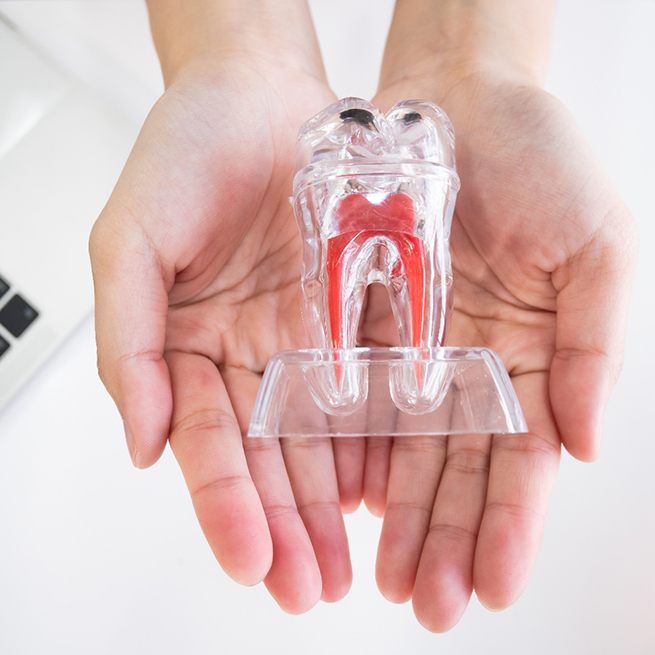
Root Canal Treatment – Burien, WA
Target the Root of the Problem

According to the EDU School of Dental Medicine, more than 15 million root canals are performed annually. Despite how routine they are and how painless the procedure is, this emergency dental treatment continues to be feared. For that reason, we’ve dedicated this page to reviewing why it’s necessary, what to expect during your time in the treatment chair, and more. Of course, you’re always welcome to schedule an appointment with us if you want to continue your research as well!
Why Choose Seahurst Park Dentistry of Burien for Root Canal Treatment?
- Same-Day Emergency Appointments Available
- Dental Insurance Welcome
- Dental Sedation Available for Maximum Comfort
Do I Need Root Canal Treatment?

At your biannual dental checkups, Dr. David Thomas will examine your most recent X-rays and look at your teeth and gums, looking for warning signs of tooth decay and infections in the process. That way, any oral health problems that are present aren’t allowed to progress. Since these appointments usually only happen two times a year, however, it’s important that you also keep an eye out for abnormal dental symptoms between visits, including:
- Prolonged sensitivity to hot/cold foods and beverages
- A sharp, stabbing pain when biting down
- Dark discoloration on one or more teeth
- Red, swollen, or bleeding gums
- A pimple-like bump on the gums near the tooth
The Root Canal Process

Patients often forget that the very first step of the entire treatment process is using a numbing agent. In other words, you don’t have to worry – you won’t feel any pain or discomfort during the procedure! After checking in to make sure you can’t feel anything and that you are ready to begin, Dr. Thomas will access the inner chambers of your tooth with a special instrument. Then, he will remove the pulp, sanitize the area, and fill it with a synthetic gutta-percha material. Finally, he will cover the treated tooth with a dental crown to protect it from damage moving forward.
The Benefits of Getting a Root Canal

Unfortunately, many patients only hear the bad (untrue) things about root canal treatment. The reality is that this tooth-saving treatment actually comes with several benefits, including:
- The procedure is virtually pain-free thanks to powerful numbing agents, cutting-edge techniques, and the latest dental technology.
- Root canal treatment has a high success rate; many patients retain their treated tooth for the rest of their lives!
- The restoration used to cover your treated tooth will be custom-made just for you, ensuring it looks and feels extremely lifelike.
Understanding the Cost of Root Canals

The final cost of your root canal will depend on the complexity of your situation, so we can’t give you a precise estimate until we examine your mouth at your consultation. While the procedure may seem pricey at first glance, it can eliminate the source of your toothache, prevent further damage, and allow you to avoid the need for more costly and invasive treatments later. We’ll be happy to go over the details of your insurance plan and financing options at your consultation.
Factors That Can Affect Root Canal Cost

While we’ll need to thoroughly evaluate your oral health situation before we can give you a proper cost estimate for your root canal treatment, there are several factors that can help determine the overall price. These include:
- The type and location of the tooth: Teeth that are farther back in the mouth are larger and have more roots, making treating them with a root canal more complicated and, accordingly, more costly.
- The complexity of the tooth: While we typically perform root canal treatments in our Burien office, we sometimes refer patients to an outside specialist who may use a different pricing structure than our own.
- If any additional services are required: Teeth usually need to receive dental crowns after root canals, and the cost of your restoration will be reflected in your bill.
Is It Cheaper to Pull My Tooth?

Some patients are tempted to think that it might be cheaper and easier to have a tooth extracted rather than have it treated with a root canal. While an extraction may seem less expensive at first, dentists recommend replacing a lost tooth as soon as possible to prevent the neighboring teeth from drifting out of alignment as well as infections and dental injuries. The cost of restorations like implants, dental bridges, or dentures and any replacements they may require over the years is not insignificant. Undergoing a root canal can save you money in the long run by allowing you to keep your natural tooth for a lifetime.
Does Dental Insurance Cover Root Canals?

Since root canals are considered major restorative procedures, dental insurance plans usually cover them at 50% to 80% after their deductibles have been met. However, it’s important to understand what your particular insurance provider offers before you commit to root canal treatment. Our team will be glad to go over the details of your plan with you to help you get everything you can out of your coverage.
Other Options for Making Root Canal Treatment Affordable

Since even people without dental insurance can need a root canal, we offer several options to make the cost of this treatment more manageable. These include:
- Financing: We offer a 6-month financing plan with 0% interest to help patients get the care they need even if they are on a budget.
- Dental Membership Plans: We offer several membership plans for a monthly fee. These plans include benefits such as professional exams, cleanings, discounted treatments, and annual X-rays.
Our staff is ready and eager to help patients understand what they can expect to pay as well as their payment options. If you have any questions, please don’t hesitate to contact our office.
Root Canal FAQs
Do Root Canals Make You Sick?
Have you heard the rumor that root canals make you sick? This stems from a poorly designed study that was conducted back in the 1920s. The reality is that this research has been disproven several times over the years. In fact, there currently isn’t any scientific evidence supporting this claim. It’s unfortunate because – despite this – many patients don’t get the restorative care they need while their tooth can still be saved.
Do Root Canals Ever Have to Be Redone?
Although the success rate of root canal treatment is high, they do sometimes have to be redone. For example, if saliva contaminated the tooth during the procedure, not all of the canals were disinfected, or new decay has developed, a second procedure may be necessary. Ultimately, the best way to proceed will be something that you and our Burien dentist will decide together, so don’t hesitate to reach out to us with any questions you have.
Why Do I Need a Root Canal if My Tooth Doesn’t Hurt?
There are loads of misconceptions about root canals, including that you only need one if your tooth hurts. The reality is that there are several warning signs of extensive dental damage, including dark discoloration on the tooth, bleeding gums, and persistent dental sensitivity. Furthermore, an infection can actually “kill” the nerve of the tooth, which renders it unable to register pain. For all of those reasons, we recommend coming in twice a year for a dental exam so that we can check the condition of each and every tooth. We also recommend talking to us about all of your treatment options and bringing any questions you have to our team instead of simply postponing the restorative care we recommend.
How Much Pain is Normal After a Root Canal?
During the procedure, your mouth will be numb, so you won’t feel any pain or discomfort. Of course, that will eventually wear off, which is when some soreness will arise. That’s why we provide our patients with aftercare instructions, including taking OTC pain medication as directed, sticking to soft foods, like mashed potatoes, and rinsing periodically with warm saltwater. In most cases, patients feel significantly better after three days. If your symptoms persist or seem to be getting worse, then give us a call.
Can Root Canals Be Prevented?
Fortunately, dental decay and damage can usually be prevented. For that reason, we encourage our patients to:
- Commit to a solid at-home oral hygiene regimen
- Come to our office every six months for a checkup and cleaning
- Limit their consumption of sugary foods and drinks
- Wear a mouthguard during sports
- Quit unhealthy habits, like smoking and chewing on ice
It’s also important that we mention here that you should get in touch with us if any abnormal dental symptoms arise between your biannual visits. That way, we can pinpoint if an untreated issue, like tooth decay, is the root of the problem.


